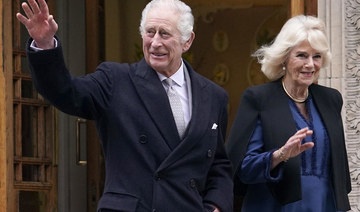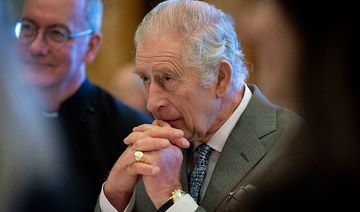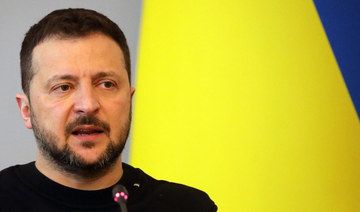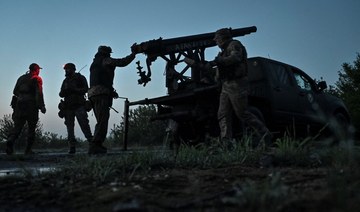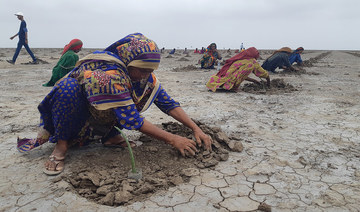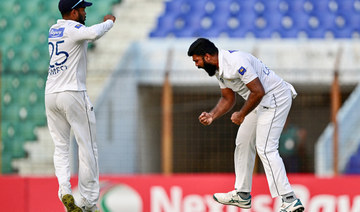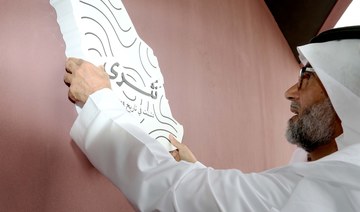PARIS: They served the French army on the frontlines in Afghanistan, sometimes bearing arms during operations by international forces against the Taliban.
But for years after the French troops pulled out, many Afghan interpreters were left exposed to revenge attacks by Islamist fundamentalists and denied asylum by the country for which they worked.
Their long fight for protection from France ended on February 1 when a top French court ordered the state to give immediate protection to all those who had been previously turned away.
As Afghanistan sinks further into violence, those who serve or have served foreign militaries are particularly at risk from the Taliban, who view them as traitors.
Zainullah Oryakhail, 30, served as an interpreter for a French battalion from 2009 to 2013 — a role for which he was occasionally armed with a French assault rifle to use in the event of an ambush.
On January 7, his long quest for asylum ended when he arrived in France with his family, a year after he fled his village 38 kilometers (around 24 miles) north of Kabul.
Oryakhail, who had been denied asylum by France in 2015, had already survived a drive-by shooting at his home and then been wounded in a suicide motorcycle bombing as he spoke to a NATO patrol outside his house.
Convinced both attacks were linked to his work with the French military, over which he had received multiple threats, he moved to a freezing, one-room apartment in a suburb of Kabul.
He survived by doing odd jobs, living in constant fear, until December 2018, when France’s Council of State, the country’s highest administrative court, ordered he be given immediate protection, along with five other interpreters whose asylum requests had been rejected in 2015.
In the landmark ruling, the court said that the state owed local staff a duty of “functional protection.”
In a follow-up decision on February 1 the council went further, extending the protection to all the interpreters whose asylum requests had been rejected, including those who missed a government deadline to apply.
The ruling, which also sets a precedent for local people employed by the French army in other conflict zones such as the Sahel region of West Africa, comes too late for some Afghans who sought safety in France.
Qader Daoudzai, an interpreter for the French military from 2010 to 2012 whose visa application was rejected in 2015, died in a bomb blast in Kabul on October 20.
He left behind a pregnant wife and three children.
Yusefi Z., another former interpreter who cannot be fully identified for safety reasons, was severely wounded, and his step-brother killed, in mid-January in a bomb blast in Kabul, where he remains in hiding.
France was the fifth-biggest contributor of troops to the NATO-led mission in Afghanistan from 2001 to 2014, when the last of its soldiers left the country.
Over the course of its long deployment, the military employed 770 local staff in positions such as interpreters, drivers and warehouse workers.
A total of 224 interpreters received visas to move to France in three waves of relocations between 2013 and 2018, according to the Association of the French Army’s Afghan Interpreters, but many were then turned down.
France is not the only country accused of failing to provide adequate protection for former Afghan employees.
A British parliamentary committee last year found Britain had “dismally failed” to look after 7,000 former Afghan staff.
Defending France’s record, a defense ministry source, who asked not to be identified, said French officials had spent a month in the region in late 2018 to hear new asylum requests and reopen old cases.
The mission was carried out “at the request of the French president, taking into account the deterioration of the situation during the past 12 months in Kabul and Kapisa,” the province where most of the French troops were stationed, the official said.
At the end of the mission, 218 long-stay visas were granted to former employees and their families, the official said, adding: “France cannot be accused of doing nothing.”
But for Quentin Mueller, co-author of a book entitled “Interpreter, a French Betrayal” (“Tarjuman, une Trahison française“) published last week, France abandoned those who were its “eyes and ears in the fight” against the Taliban.
“It treated them like ordinary migrants who would like to take advantage of the French system,” he said.
The book’s other author Brice Andauer denounced the asylum process as “intentionally opaque and secretive,” saying many applicants had been turned down with no reason given.
Noting that the French army’s local Afghan staff were routinely subjected to background checks, he argued there were few chances of extremists slipping through the system into France.
“Furthermore, the Taliban have never advocated global jihad,” he pointed out.
Today, there are still close to 550 former interpreters and other service providers who could claim protected status in France.
Some have already joined the migrant trail to Europe or moved to neighboring countries, having lost hope of being brought to safety.
French victory ends long asylum battle of Afghan interpreters
French victory ends long asylum battle of Afghan interpreters
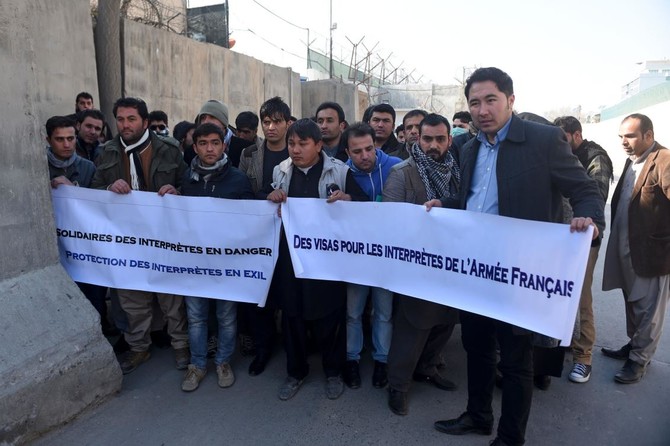
- For years after the French troops pulled out, many Afghan interpreters were left exposed to revenge attacks by Islamist fundamentalists
- A top French court ordered the state to give immediate protection to all those who had been previously turned away
Top French university loses funding over pro-Palestinian protests
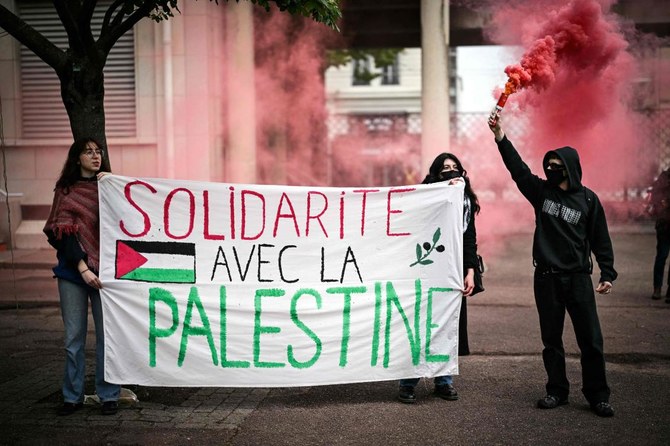
The university’s acting administrator, Jean Basseres, said he regretted the decision
PARIS: The Paris region authority sparked controversy Tuesday by temporarily suspending funding for Sciences Po, one of the country’s most prestigious universities, after it was rocked by tense pro-Palestinian demonstrations.
“I have decided to suspend all regional funding for Sciences Po until calm and security have been restored at the school,” Valerie Pecresse, the right-wing head of the greater Paris Ile-de-France region, said on social media on Monday.
She took aim at “a minority of radicalized people calling for anti-Semitic hatred” and accused hard-left politicians of seeking to exploit the tensions.
Regional support for the Paris-based university includes 1 million euros earmarked for 2024, a member of Pecresse’s team told AFP.
On Tuesday, the university’s acting administrator, Jean Basseres, said he regretted the decision.
“The Ile-de-France region is an essential partner of Sciences Po, and I wish to maintain dialogue on the position expressed by Mrs.Pecresse,” he told French daily Le Monde in an interview published Tuesday.
In an echo of tense demonstrations rocking many top US universities, students at Sciences Po have staged a number of protests, with some students furious over the Israel-Hamas war and ensuing humanitarian crisis in the besieged Palestinian territory of Gaza.
France is home to the world’s largest Jewish population after Israel and the United States, as well as Europe’s biggest Muslim community.
University officials called in police to clear a protest last week. On Monday, police broke up a student protest demanding an end to Israel’s bombardment of Gaza at Sorbonne, another top French university.
Higher Education Minister Sylvie Retailleau said on Tuesday the French government had no plans to suspend funding for Sciences Po.
Speaking to broadcaster France 2, she estimated the state’s funding for the university at 75 million euros. She said there had been “no anti-Semitic remarks” and no violence had been committed during the demonstrations.
Both Basseres and Retailleau also said there were no plans to suspend Sciences Po’s collaboration with universities in Israel.
Critics on the left have denounced Pecresse’s announcement.
“It’s shameful and an absolute scandal,” said Mathilde Panot, the head of hard-left France Unbowed (LFI) deputies in parliament, adding the behavior of the students was a “credit to the world and a credit to our country.”
Panot and Rima Hassan, a Franco-Palestinian activist who is running on the LFI list for European elections, were on Tuesday questioned in an investigation into suspected justification of “terrorism” over comments on the October 7 attack by Hamas on Israel.
Several hundred people staged a solidarity rally in support of the two women on Tuesday morning.
“In what democracy are counter-terrorism methods used against political activists, community activists and trade unionists?” Panot, 35, told her supporters, who chanted “Resistance” and waved Palestinian flags.
“I want to tell the pro-Israeli lobby organizations behind these complaints that they will not silence us,” added 32-year-old Hassan.
The war started after Hamas’s October 7 attack on southern Israel resulted in the deaths of 1,170 people, mostly civilians, according to an AFP tally of Israeli official figures.
Israel’s retaliatory offensive has killed at least 34,535 people in Gaza, mostly women and children, according to the health ministry in the Hamas-run territory.
Palestinian militants also took some 250 hostages on October 7. Israel estimates 129 remain in Gaza, including 34 believed to be dead.
King Charles III resumes public duties as he fights cancer
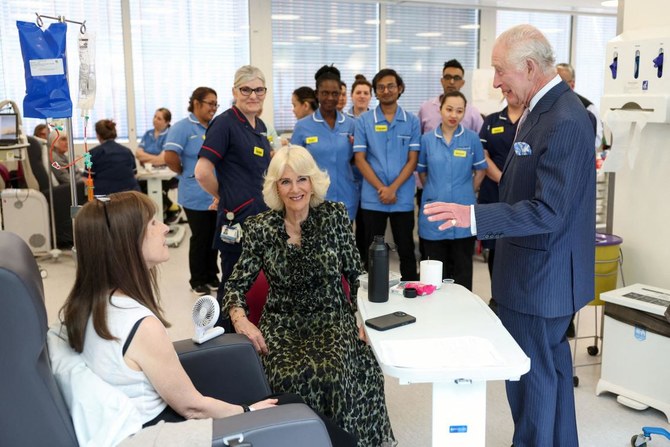
- The British head of state appeared relaxed as he and his wife Queen Camilla met patients and staff at the University College Hospital Macmillan Cancer Center
- He talked to patients receiving chemotherapy at a day unit
LONDON: King Charles III on Tuesday reportedly told fellow cancer patients “I’m well,” as he carried out his first official public engagement since being diagnosed with the condition.
The British head of state appeared relaxed as he and his wife Queen Camilla met patients and staff at the University College Hospital Macmillan Cancer Center in central London.
He talked to patients receiving chemotherapy at a day unit, including 60-year-old Asha Millen, who has bone marrow cancer.
“I said, ‘How are you?’ and he said, ‘I’m well’,” she told reporters afterwards.
Another patient, Lesley Woodbridge, 63, said the king sympathized with her, and added: “I’ve got to have my treatment this afternoon as well.”
Charles, 75, suspended most of his duties in February after cancer was found while he was being treated for an enlarged prostate the previous month.
The exact nature of his cancer has not been disclosed but doctors said last week they were “very encouraged” by the progress of his treatment as an out-patient and “positive” about his recovery.
His daughter-in-law Catherine, Princess of Wales, 42, underwent abdominal surgery in January and said in March that she was receiving chemotherapy.
Again, no details were given about what type of cancer she has. Kate, as she is widely known, is married to Charles’s elder son and heir Prince William.
Tuesday’s event was the first in a number of planned engagements in the coming weeks and designed to raise awareness of the importance of early cancer diagnosis and highlight innovative research, Buckingham Palace said.
Charles, who succeeded his mother Queen Elizabeth II in September 2022, was officially crowned king on May 6 last year.
He has been seen attending church services since his diagnosis and at selected audiences. He has also continued his official state business.
His treatment will continue but his schedule in the coming weeks will be reduced and subject to medical advice, a spokesperson added.
His engagements will include a state visit by Emperor Naruhito and Empress Masako of Japan in June.
The chief executive of University College London Hospitals group, David Probert, said Charles “deliberately went out of his way to meet as many staff and patients as he could.”
Patients were “delighted” to see him, he told Sky News, and described the visit as “incredibly uplifting.”
Members of the public last week welcomed the king’s return to some duties, praising him for raising awareness about cancer, which will affect one in two people, according to Cancer Research UK.
Probert said the king’s announcement had led to a surge in people looking up symptoms and seeking out treatment.
“It’s a huge issue in today’s society,” Keegan Gray, 23, a demolitions manager from New Zealand, told AFP on Friday.
“A lot of people have cancer and a lot of people they keep it to themselves, they’re a bit shy about it,” he added after the news Charles would resume some public duties.
Gray said it was “really beautiful” that the king was raising awareness of cancer and the work of treatment clinics.
Charles and Kate’s cancer diagnoses have created a headache for the royal family, with both having postponed public engagements.
William has also taken a step back to support his wife and their three young children, leaving fewer senior royals to fill the schedule.
Camilla, 76, has stepped in to take over many of her husband’s engagements. Charles’s sister Princess Anne and his youngest brother Prince Edward have also taken on more prominent roles.
Charles’s largely estranged younger son, Prince Harry, is no longer a working royal but is expected in London on May 8 to mark the 10th anniversary of his Invictus Games for disabled military veterans.
He will then join his American wife Meghan on a visit to Nigeria.
Russia says shot down US-made missiles launched by Ukraine
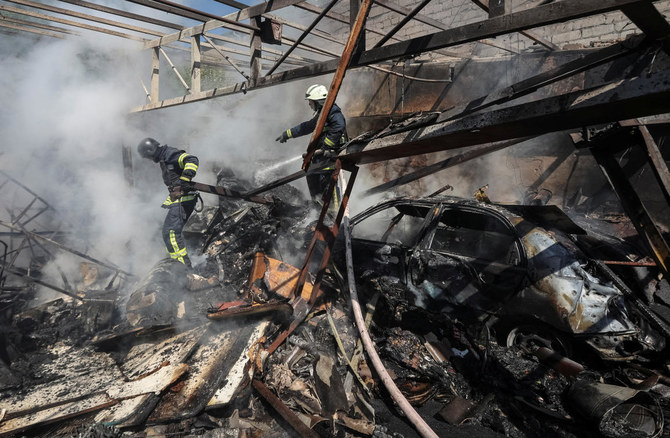
- Washington has said it had supplied the arms to Ukraine
- The Russian-installed head of Crimea, Sergei Aksyonov, said one of the missiles was downed in the village of Donskoye
MOSCOW: Russia said Tuesday it had shot down six US-supplied tactical missiles launched by Ukraine, with officials in annexed Crimea saying some were downed over the Black Sea peninsula.
Washington has said it had supplied the arms to Ukraine, which has been asking for more powerful weapons for months as it struggles to contain advancing Russian forces.
Moscow’s defense ministry said it had destroyed six Army Tactical Missile System (ATACMS) rockets “in the last 24 hours,” without saying where they were shot down.
The Russian-installed head of Crimea, Sergei Aksyonov, said one of the missiles was downed in the village of Donskoye, outside the main city of Simferopol.
“After an ATACMS missile was shot down, undetonated submunitions scattered,” Aksyonov said on Telegram.
“If you find such a weapon, do not pick it up or come close and call emergency services or the police,” he warned.
Aksyonov posted a photograph of a metal ball which he said was part of the destroyed missile.
Russia did not say if the missiles caused any damage in Crimea.
Earlier, an official from Russian-occupied southern Ukraine, Vladimir Rogov, said that air defense had been in operation over Simferopol and the town of Dzankoi, in northern Crimea.
Ukraine has regularly attacked Crimea during Moscow’s more than two-year offensive.
But it did not comment on Tuesday’s attack.
Last week, the United States said it had sent ATACMS missiles to Ukraine in February.
Ukrainian forces are now awaiting the arrival of new US weapons, green-lighted by President Joe Biden after months of being blocked by political wrangling in Congress.
Sri Lanka joins Global South-North dialogue through Riyadh WEF meeting
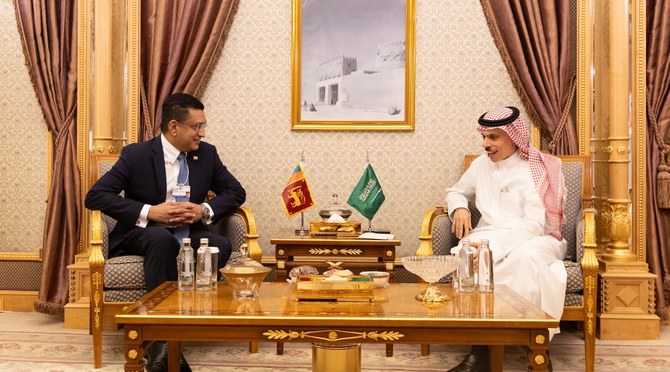
- Foreign Minister Ali Sabry was among the special meeting’s speakers
- He represented the Global South perspective at the invitation of Saudi FM
COLOMBO: Sri Lanka is trying to position itself in the dialogue between the Global South and North, its foreign minister said, following the World Economic Forum’s special meeting on global collaboration organized by Saudi Arabia.
The WEF’s Special Meeting on Global Collaboration, Growth and Energy for Development convened 1,000 global leaders arriving in Riyadh from 92 countries on April 28-29 to find actionable, collaborative and sustainable solutions to shared challenges.
The meeting saw a focus on the Global South, or countries, mostly in the Southern Hemisphere and largely in Africa, Asia and Latin America, which until recently have often been described as developing or less developed.
Sri Lanka FM Ali Sabry represented the Global South perspective at the forum’s session titled “North to South, East to West: Rebuilding Trust” alongside his Saudi counterpart, Prince Faisal bin Farhan.
“It was a great opportunity for me to showcase Sri Lanka and the challenges that countries in the Global South face, and also to position Sri Lanka as an important player, particularly in the Global South in shaping the future … for collaboration, peace and stability, rather than confrontation,” he told Arab News.
The minister was in Riyadh at the invitation of Prince Faisal, with whom he also held a meeting.
“We look forward to elevating the partnership,” Sabry said.
“We intend to sign the investment protection agreement that would probably pave the way for the inflow of investment into Sri Lanka.”
He also met other Saudi leaders during his visit to explore further cooperation possibilities.
The Kingdom has expanded ties with the South Asian island nation since last year, agreeing to broaden political consultation and launching a new employment scheme aimed at boosting Sri Lanka’s manpower exports.
Colombo has since sought Saudi assistance in developing several of its key sectors, including tourism and agriculture.
Saudi Hajj minister in Jakarta as Indonesia prepares record number of pilgrims
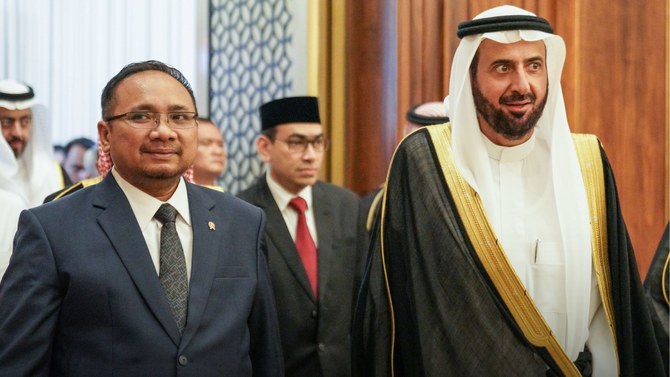
- 241,000 Indonesian pilgrims are set to perform the Hajj this year
- Saudi minister will launch tourism exhibit in Jakarta on Wednesday
JAKARTA: Saudi Arabia’s Hajj and Umrah Minister Tawfiq Al-Rabiah held meetings in Jakarta on Tuesday to coordinate pilgrimage preparations as Indonesia is going to send its largest-ever Hajj contingent this year.
The Kingdom has approved the 2024 quota of 241,000 Indonesian pilgrims, an increase of 20,000 from last year.
Al-Rabiah held discussions with Indonesia’s Religious Affairs Minister Yaqut Cholil Qoumas on ways to streamline Hajj services for the Asian nation’s pilgrims.
“I just had a long and productive meeting and discussion with my brother, the Indonesian religious affairs minister, which was focused on giving the best services and ease for Hajj and Umrah pilgrims from Indonesia,” Al-Rabiah said during a press conference.
“The Saudi government has revitalized historical and Islamic sites in Makkah and Madinah, and other sites related to pilgrimage and the journey of Prophet Muhammad … and we invite all pilgrims to come and visit these sites.”
Indonesia’s higher quota will help shorten the wait for some pilgrims by a few years, which is especially important for the elderly in the Southeast Asian nation. Many in the country wait up to 45 years for their turn, according to official estimates.
Qoumas said his interactions with Al-Rabiah had been meaningful.
“Maybe we can consider Indonesia as having received a special treatment from the Saudi government, as we are welcoming a big delegation led directly by the Saudi Hajj and Umrah minister, who are here to ensure that Indonesian Hajj pilgrims this year will get the best services from the Kingdom of Saudi Arabia,” Qoumas said.
“As a representative of the Indonesian government, we feel very grateful and thankful.”
Al-Rabiah is scheduled to inaugurate on Wednesday a Saudi Tourism Authority event showcasing the variety of travel destinations the Kingdom has to offer as it aims to attract more international visitors under Vision 2030.




